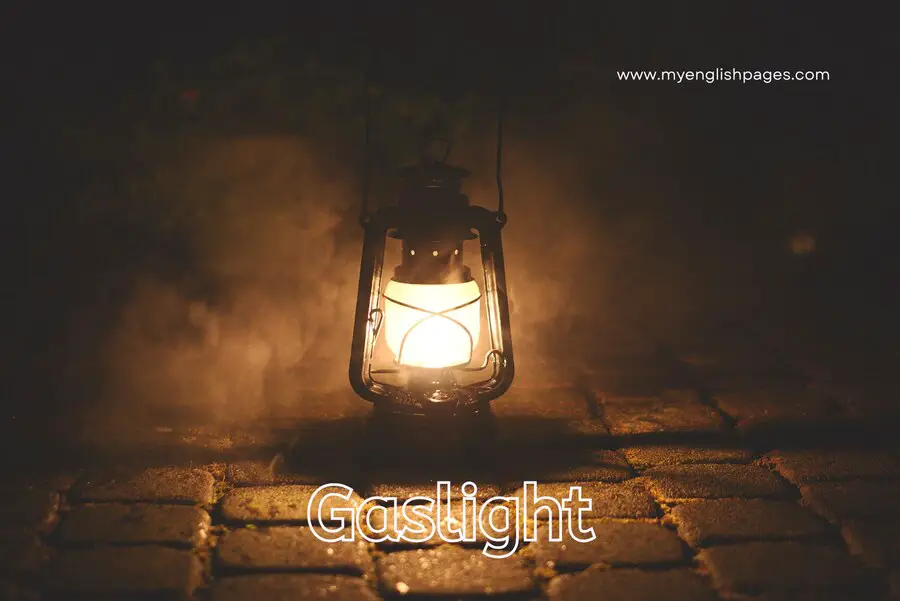What Does “Gaslighting” Mean?

Have you ever heard someone say, “Stop gaslighting me!” and wondered what it really means? This term has become popular in psychology, relationships, and even politics, but its origins are surprisingly old. Let’s break down what “gaslighting” means, where it comes from, and how to use it correctly.
Definition of Gaslighting (With Example)
Gaslighting is a form of psychological manipulation where someone makes another person doubt their own memory, perception, or sanity. It’s a subtle but harmful tactic often used in toxic relationships, workplaces, or even by authoritarian figures.
Example:
“When Sarah confronted her boyfriend about his lies, he laughed and said, ‘You’re imagining things—that never happened.’ He was gaslighting her to make her question her own memory.”
Gaslighting or Gaslamping?

You might occasionally see “gaslamping” used instead of “gaslighting,” but this is usually a misspelling. The correct term is gaslighting, derived from the 1944 film Gaslight. However, “gaslamp” refers to old-fashioned street lamps (unrelated to manipulation).
Origin of the Idiom
The term “gaslighting” originates from Patrick Hamilton’s 1938 play Gas Light (titled Angel Street in the U.S.) and its famous 1944 film adaptation starring Ingrid Bergman.
In the story, a husband secretly dims the gas-powered lights in their home and then insists his wife is imagining it, making her question her sanity. His goal? To make her doubt her own perceptions so he can control her.
This chilling tactic—denying reality to manipulate someone—became the defining example of psychological abuse. Over time, “gaslighting” evolved into a widely recognized term for emotional manipulation that makes victims second-guess their own memory, judgment, and sanity.
The film’s impact was so strong that “gaslighting” entered psychology and everyday language as the go-to word for this form of deception.

Similar Phrases or Expressions
- Mind games – Psychological manipulation to control someone.
- Emotional manipulation – Influencing someone’s feelings for personal gain.
- Brainwashing – Forcing someone to adopt new beliefs through pressure.
- Stonewalling – Refusing to engage in communication to frustrate the other person.
Example Sentences with “Gaslighting”
- “Politicians sometimes gaslight the public by denying facts, even when there’s clear evidence.”
- “If your boss constantly tells you, ‘You’re too sensitive,’ they might be gaslighting you.”
- “She realized her friend was gaslighting her when he kept twisting past events to make her seem irrational.”
- “Gaslighting in relationships can lead to long-term self-doubt and anxiety.”
FAQs About Gaslighting
What is the difference between greenlighting and gaslighting?
– Greenlighting = Giving approval for something to proceed (e.g., “The studio greenlit the new movie.”)
– Gaslighting = Manipulating someone into doubting their reality.
Is “gaslighted” grammatically correct?
Both “gaslighted” and “gaslit” are accepted.
Is it “greenlighted” or “greenlit”?
Both are correct.
What does “gaslamp” mean?
A gaslamp is an old-fashioned lamp powered by gas, unrelated to psychological manipulation.
What does “gaslighting a person” mean?
It means manipulating someone into questioning their own thoughts, feelings, or memories.
How do you outsmart a gaslighter?
– Trust your instincts – If something feels off, it probably is.
– Document events – Keep records of conversations.
– Set boundaries – Limit interactions with the manipulator.
– Seek support – Talk to trusted friends or a therapist.
Is gaslighting slang?
Originally, yes—it came from a movie. Now, it’s a recognized psychological term.
Is gaslighting rude?
It’s more than rude—it’s abusive. Deliberately making someone doubt their reality is harmful behavior.
Final Thoughts
Gaslighting is a serious form of manipulation that can damage self-esteem and mental health. It refers to a psychological tactic where someone makes another person doubt their memory, perception, or sanity. Recognizing it is the first step to protecting yourself.
Have you ever encountered gaslighting?
Want to learn more English idioms? Check out our other blog posts about Idiomatic Expressions!
This idiom is in the relationships category


